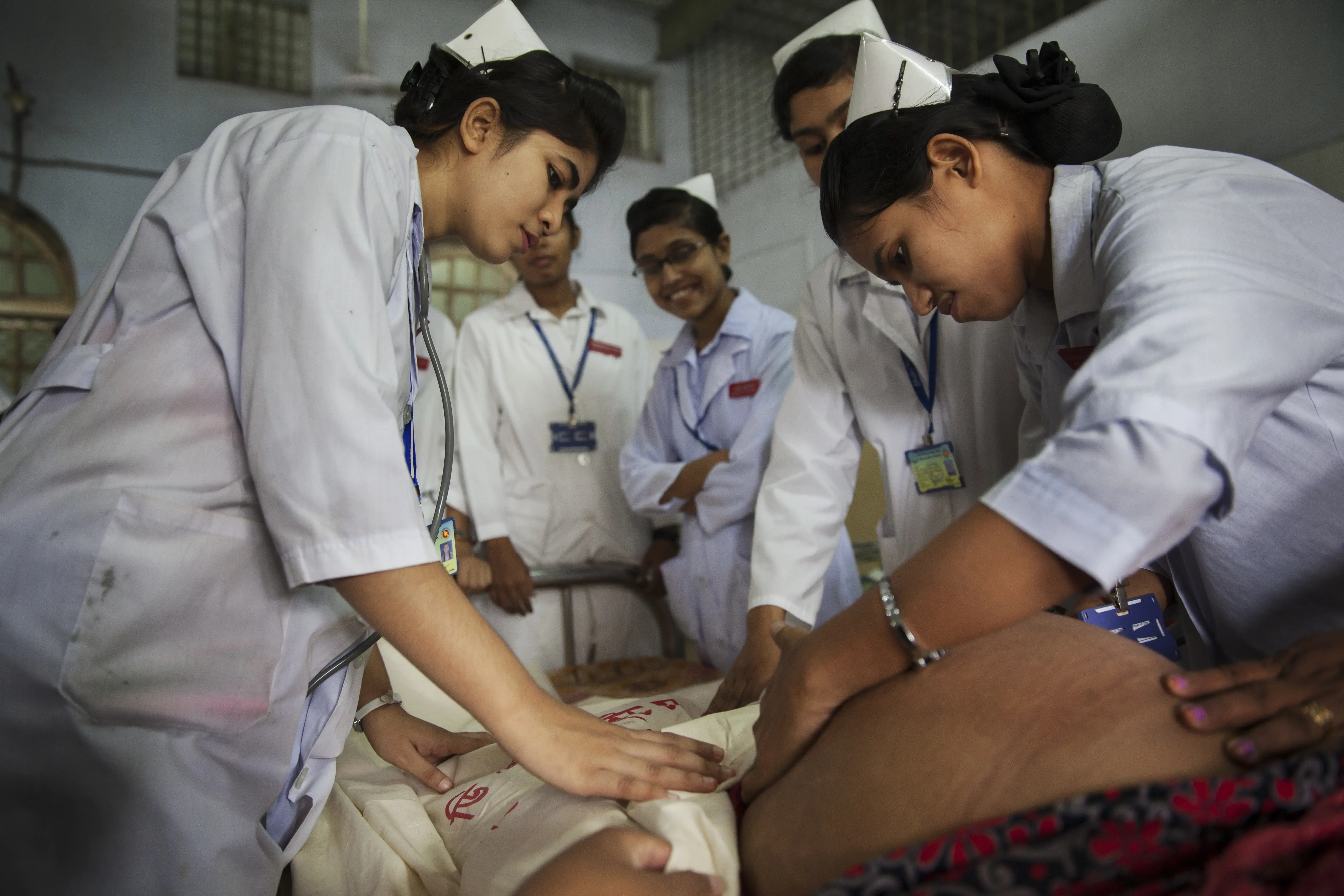While Bangladesh has made gains in maternal health provisions, there are still marked gaps and unmet needs for services. 38% of deliveries in Bangladesh still take place in the home, and in only 42% of cases, a skilled birth attendant is present, directly contributing to the 5,200 maternal deaths estimated to occur each year because of pregnancy-related causes—a high figure by international standards, but down from close to 12,000 per year in 2004. As many as two-thirds of these deaths would be preventable. Global evidence shows that midwives who are educated and regulated to international standards can provide 87% of the essential care needed for women and newborns, and investing in midwifery education and deployment to community-based services can potentially yield a 16 fold return on investment in terms of lives saved and costs of caesarian sections averted.
Since 2010, rapid developments have taken place to establish the midwifery profession in Bangladesh. A commitment was made by Prime Minister Sheikh Hasina in 2010 to create posts for 3000 midwives across the country. Following these post-basic trainings was offered to the nurses as an interim measure, and 1600 have been qualified with 6 months of advanced training as per International Confederation of Midwives (ICM) standards. A three-year direct entry diploma course was established to educate professional midwives distinct to nursing. 597 midwives graduated from the three-year diploma course in midwifery in late 2015 and were officially licensed in February 2016. 1200 certified midwives who completed a six-month post-basic training have already been posted to sub-district level health facilities. Among them, those who have a Bachelor’s Degree are utilized as midwifery faculty, midwifery mentors, and supervisors.
In 2013, a direct-entry 3-year diploma program distinct to nursing started its journey at 20 public and 7 private institutes (now expanded to 62 Public and 108 private institutes). In 2022, a 2-year BSc in Midwifery started in 4 public and 1 private institutions. 150 nursing faculty have graduated with a Masters in Sexual and Reproductive Health from Dalarna University, Sweden. Additionally, faculty have received training in curriculum implementation, pedagogy, leadership, OSCA and skill lab teaching, and peer mentorship.
An in-country Midwifery Masters curriculum has been drafted; preparation is ongoing to start in two approved public institutes. Two midwifery faculty are currently undertaking a PhD in midwifery in Thailand. Accreditation of midwifery education institutes has recently been introduced, with a programme of Quality Improvement (with 20 dedicated midwifery faculty) in conjunction with the University of Gothenburg. Other initiatives include the minimum essential learning equipment, a dashboard for monitoring quality & reporting, mock tests for licensing exams, student log books, academic calendar monitoring, and most recently, a 6-month internship for midwives.
Midwifery regulation
The Bangladesh Nursing and Midwifery Council is responsible for approving and accrediting midwifery education institutions, issuing a Code of Ethics, and re-licensing for midwives (after 5 years), which will be linked to evidence of midwives’ ongoing CPD.
Professional Midwifery Association
The Bangladesh Midwifery Society was formed in 2010. From 2017-2022, UNFPA supported a twinning partnership with the Royal College of Midwives UK to build organisational and advocacy capacity, develop Young Midwife Leaders, and transition society from being nurse-led to midwife-led. Capacity increased from 29% to 75%, and 63 Young Midwife Leaders have been developed. The society is now entirely governed by Diploma Midwives. A new partnership started with the International Confederation of Midwives in 2023.
Midwifery Workforce
There are now 7230 Licensed diploma midwives in Bangladesh; 2557 are deployed in government facilities (260 at the rural union level), and 5000 more posts have been approved and will be deployed phase-wise. 400+ midwives are working in humanitarian response with Rohingya refugees and the host community in Cox’s Bazaar area. More midwives are employed in the private sector, but many are not undertaking dedicated midwifery posts and roles.
Enabling Environment for Midwifery
A system of supportive supervision is being introduced through District Public Health Nurses (DPHNs) and Assistant DPHNs. UNFPA’s PRIMER Programme (with an associated App) is helping district SRHR teams to develop annual plans, including creating an enabling environment for midwives. Medical and Nursing Managers have capacity building and advocacy oversight. The Directorate General of Nursing and Midwifery Services (DGNM) is implementing in-service training on clinical mentorship and preceptorship for all midwifery faculty and hospital staff involved in helping students to translate classroom learning into clinical competencies.
Centers for Excellence in midwifery education have been established. These educational programs are hosting foreign midwifery mentors to support the faculty and strengthen the educational quality. As part of these Centers for Excellence Upazila health centers, where midwives are deployed, have been chosen to demonstrate that midwifery-led care is the best care maternity center to mentor the deployed midwives and ensure an enabling environment for student clinical practice, as has been recognized widely on a global level. The DGNM is providing orientations to support faculty, DPHN, ADPHN, and nurse managers in their transition into the professional dedicated faculty, mentors, and supervisors of the professional midwives, to help facilitate enabling environments where midwives can practice to their full scope of practice to provide comprehensive SRHR services in regards to ICM competencies.
Midwives recognised as integral to Sexual, reproductive, maternal, newborn, and adolescent health (SRMNAH)
95% of Upazila and 66% of Union Facilities now have midwives. Midwives conduct 75% of deliveries and provide comprehensive SRMNAH (including initial stabilization of obstetric and newborn emergencies, IPPFP, VIA screening, MR/PAC services, GBV prevention and response, and fistula prevention). National and local IDM events are well-attended, and DGFP is now ready to deploy midwives. Private sector engagement is increasing. The contribution of midwives is increasingly being acknowledged, and midwives are winning national and international awards. In April 2016, 30 members of the nursing faculty teaching midwifery students in 15 nursing institutes across Bangladesh enrolled in a blended master’s programme with the Dalarna University, Sweden, supported by UNFPA, which is the first of its kind in Asia. A total of 150 have now graduated and working as dedicated midwifery faculty throughout the country.


